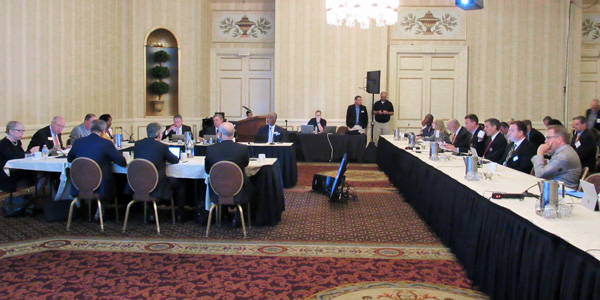By Amanda Durish Cook
ST. PAUL, Minn. — MISO revealed three new candidates for its Board of Directors and reported on an expected budget overrun during the quarterly board meeting on Thursday.
Board Chairman Michael Curran opened the meeting with a moment of silence for the victims of Hurricane Maria in the Caribbean and Puerto Rico. “It underscores the importance of what we do,” Curran said.
Curran announced incumbents Baljit Dail and Thomas Rainwater and newcomer Theresa Wise, former chief information officer for Delta Air Lines, are the candidates for three new terms beginning in January.
If any of the three fails to receive a majority vote, stakeholders will consider alternates John “Jeb” Bachman, former partner at PricewaterhouseCoopers, and Wolfgang Richter, former chief information officer at PricewaterhouseCoopers. In MISO board voting, alternates would only rotate into the election for a second membership vote if any of the candidates in the first vote did not receive a majority of the vote.
The slate was prepared with help from search firm Russell Reynolds. In June, Dail — who by the end of the year will reach MISO’s three, three-year term limit — was granted a one-time waiver to stand for this year’s election. (See “Committee Permits Consideration of Extra Term for Dail,” MISO BoD Briefs: June 22, 2017.)
Senior Vice President of Compliance Services Stephen Kozey said electronic voting will be open for 39 days — “not a short amount of time” — and 25% of MISO’s 138 voting members will need to cast ballots to reach an election quorum.
“We’ve been lucky in the past to have voting participation over 60%,” Kozey said.
Noticeably absent from the roster was current Director Paul Bonavia, who had been seeking re-election as of the last board meeting.
Bonavia said that when he announced in summer that he would stand for re-election, he fully intended to do so, but since that time, unforeseen “personal and family matters totally unrelated” to MISO have arisen.
“It’s been a pleasure to be part of the MISO board, and we still have a lot of work to do this year, and I promise to stay fully engaged. I also would like to congratulate MISO on a wonderful roster of candidates,” Bonavia said.
Small Budget Overrun
To date, MISO is $1.8 million under its annual budget, but Chief Financial Officer Melissa Brown said the RTO will likely spend $240.4 million by year-end, exceeding its $239.1 million budget by $1.3 million (0.5%).
As of the end of July, MISO was under budget by 1.3%, having spent $138.7 million of the $140.5 million allotted for the first six months.
In June, Brown prepared the board for a possible 1.2% budget overrun, due in part to MISO’s lower-than-expected employee vacancy rate. (See “MISO Reports Likely Year-End Overage; Board Urges Staff Stick to Budget,” MISO BoD Briefs: June 22, 2017.) The low rate persists, Brown said, but MISO has since shifted some project spending around.
Brown said that while employee retention and spending on employee medical benefits is the biggest cause of the overrun, it’s a sign that MISO’s recent programs aimed at retaining talent are working.
MISO’s capital spending in 2017 is similarly expected to go over budget. Brown said MISO will probably spend $30.2 million instead of its assigned $29.9 million on capital projects (1%).
So far this year, capital spending is $20.1 million, under budget by $600,000 (2.9%).
Dail said stakeholders can expect MISO’s other capital spending to shrink over the next few years to make room for MISO’s multiyear, $130 million project to replace its market system computer platform.
The replacement took more of a share of this year’s overall budget than originally anticipated. The program began with a $1.7 million spend in 2017, but MISO won board approval to increase it to $5.2 million so that staff could start early on vendor evaluation and gathering bids. (See MISO Makes Case for $130M Market Platform Upgrade.)
“It was never easier for me to vote for a budget increase,” Director Barbara Krumsiek said. “It means you’re moving at such a pace” that early spending is needed. “I’d like to thank you for asking for the increase.”
Brown said MISO offset some of the extra platform spending by not having to spend money developing a separate, three-year forward capacity auction for competitive retail areas — a proposal that FERC rejected.








